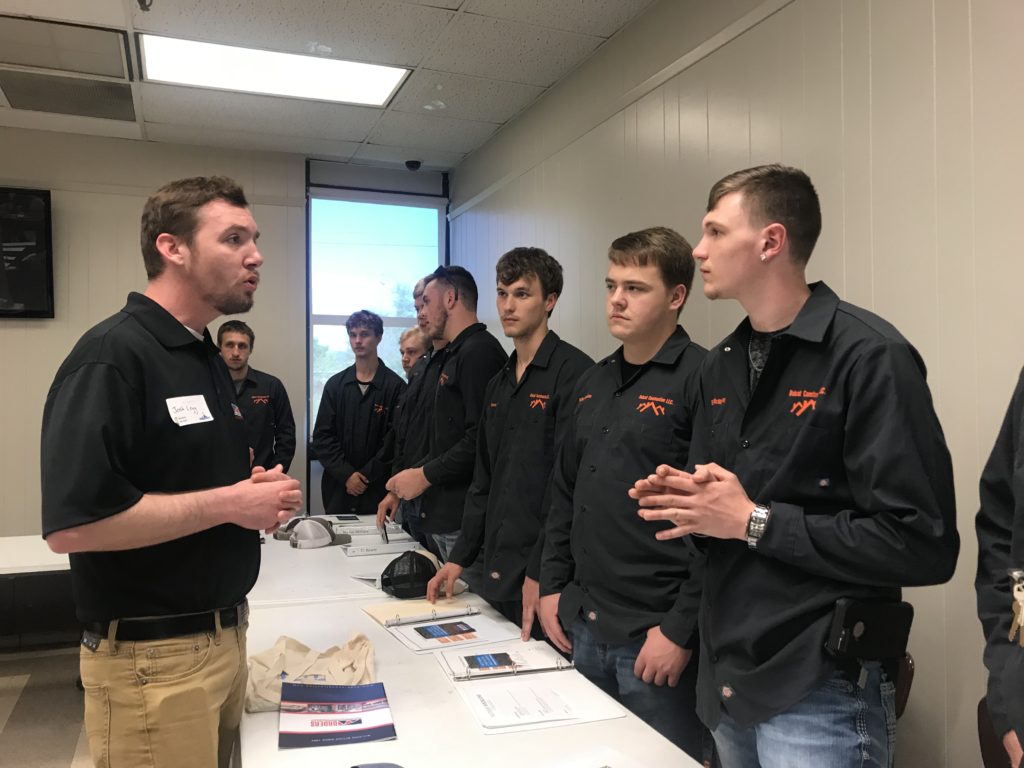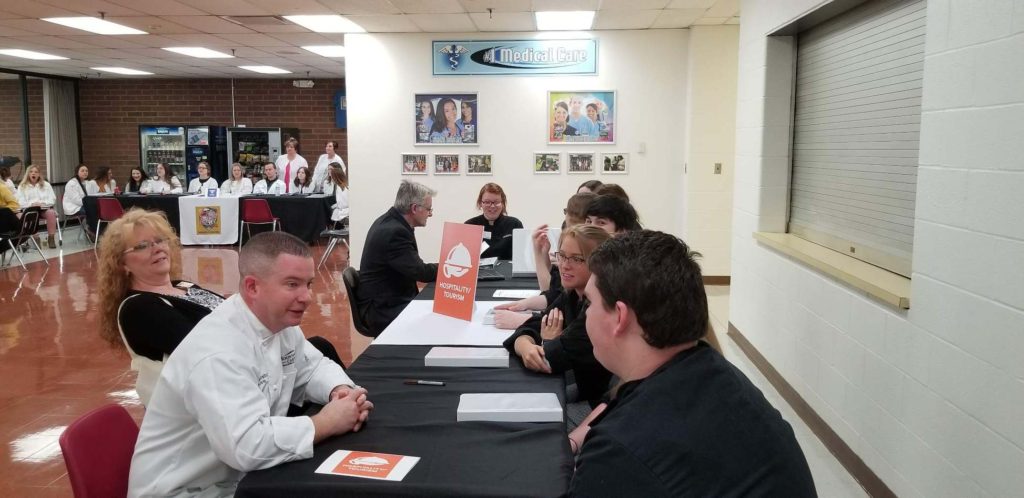By Dr. Kathy D’Antoni
“Business’ number one problem is finding qualified workers. At the current pace of job growth, if sustained, this problem is set to get much worse. These labor shortages will only intensify across all industries and company sizes.” – Mark Zandi, Chief Economist, Moody’s Analytics
When business and education communities work together, great things can happen. This was evident in the success of recent Reverse Job Fairs held by the West Virginia Department of Education (WVDE) Career Technical Education (CTE) centers across the state. The Reverse Job Fairs were held in the eight West Virginia WorkForce regions. The goal was to connect employers with West Virginia’s emerging workforce—graduating CTE students—who are drug-free, certified by industry-recognized standards and interested in employment after graduation.
The WVDE partnered with the West Virginia Department of Commerce to invite business and industry representatives to attend the fairs using a reverse approach to the traditional industry job fairs. Instead of students attending an event where businesses set up booths to look for potential employees, the business and industry representatives came to the schools to talk with CTE students who were set to graduate and enter the job market. Students shared their portfolios and resumes as documentation of their knowledge and skills with the visiting employers. Since the events were held at CTE centers, students had the opportunity to display their skills on classroom equipment if needed. From agriculture to architecture and transportation to tourism, the fairs brought attention to the high level of preparation students receive and the technical skill sets they possess before ever stepping foot in their first full-time job.
West Virginia, like the rest of the country, faces a critical need for skilled workers. According to data from the National Skills Coalition, 57 percent of the state’s jobs are in middle-skill sectors that require education beyond high school but not necessarily a four-year degree. These jobs make up the majority of the nation’s workforce as well. Both nationally and in West Virginia, key industries have a difficult time finding workers to fill these jobs, thus creating a skills gap. It is estimated that demand for middle-skill jobs will remain strong through 2024, partly because of the number of people currently holding these jobs who are moving toward retirement and there are fewer workers entering the pipeline to replace them.

The primary focus of the WVDE’s career tech centers is to address the demands of the state’s workforce. According to WorkForce West Virginia’s projections, there is high demand for carpenters, electricians, machinists, welders, mechanics and bus drivers, among many others. This shortage will remain high through 2026. CTE students fill these pathways as a course of study and each year graduate with industry-standard certifications. Last school year, West Virginia’s CTE students earned more than 14,000 industry-recognized credentials, and they scored above the national average on career readiness indicators.
The Simulated Workplace initiative is the synergy behind West Virginia’s CTE success. Simulated Workplace companies are part of every CTE classroom. Working with state businesses, the WVDE developed these powerful learning environments in 2013 to maximize student learning and transform the traditional classroom into student-led, simulated companies that follow business processes and industry guidelines. The structure allows students to not only meet industry recognized skill sets but also gain employer-valued soft skills such as communication, problem solving, critical thinking and the ability to work in teams. West Virginia consistently receives national recognition for the program and its effectiveness in preparing the emerging workforce. The next step in the process is connecting the students to employment.
The Reverse Job Fairs are an important step in bridging the communication gap between the employment opportunities and young people in West Virginia. The fairs brought 239 business representatives from 133 unique companies to these locations:
- Carver Career Center, Kanawha County
- Fayette Institute of Technology, Fayette County
- James Rumsey Technical Institute, Berkeley County
- John D. Rockefeller Career Center, Hancock County
- Mid-Ohio Valley Technical Institute, Pleasants County
- Monongalia County Technical Education Center, Monongalia County
- Randolph Technical Center, Randolph County
- Spring Valley Career and Technical Education Center, Wayne County
The response from the business community has been overwhelmingly positive. Employers learned these students have been participating in random drug testing over the past two years, so they are drug free and professionally prepared for the workforce. During the fairs, a number of students were offered jobs on the spot while others were offered future job interviews and possible internships. All students were able to talk with business representatives, which hopefully will assist them in their job search endeavors. While many people in attendance had no idea this resource existed at the CTE centers, they were dedicated to returning for recruitment efforts afterward.

According to Dan Enich, director of secondary, adult and career education at John D. Rockefeller IV Career Center, the Hancock County event was a great success.
“The event surpassed our expectations,” he says. “We had approximately 40 businesses, community colleges and interested stakeholders from our community in attendance, and U.S. Senator Joe Manchin’s office was also represented. The participating students and businesses were very excited and felt that the purpose of the job fair was extremely relevant to the current employment landscape in this area.”
Partnering with the West Virginia Development Office, the Reverse Job Fairs will continue to grow as word circulates about the resource they provide. They have changed perceptions about the quality and skill level of young adults available for employment. The students are taught by and have the benefit of highly trained and highly skilled instructors who understand the craft behind the work and instill that knowledge in their students. Beyond the industry standard, these students are ingrained with lessons through Simulated Workplace on the importance of showing up daily and on time for work, the interpersonal skills required on the job and the ability to build a career through a strong work ethic. These emerging workers are building tiny homes for displaced people, solar panels that are used in the Midwest and, in partnership with West Virginia State Parks, installing bath houses, benches and other structures at numerous state parks. Next school year, the WVDE will establish an entrepreneurial track within CTE to provide entrepreneurial skill sets for students who are interested in starting a business. The goal is to provide the guidance, knowledge and support so a student’s tenacity, creativity, perseverance, dedication, skills and abilities can help build the life they desire—hopefully in West Virginia.
About the Author

Dr. Kathy D’Antoni is the associate superintendent of career technical education, adult education, governor’s economic initiatives and diversion and transition programs at the West Virginia Department of Education.









